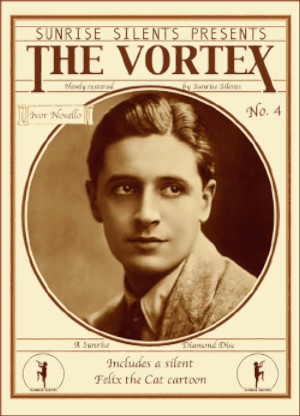- This essay will inevitably contain spoilers!
'THE VORTEX' (1928)

- A review by Richard Harrison (2008)
In the modern world where musicians think they are- by implication-
actors, and vice-versa, it is intriguing to note that this
‘cross-pollination’ is by no means a new concept. Ivor Novello,
however, could both act and sing. He could also write (his
prolific output running to an estimated 250 songs, several plays and
even dialogue- most bizarrely for Tarzan The Ape Man (1932).
Classically handsome, Novello’s influence is seen most today in the
eponymous music award named in his honour and also for his chilling
appearance in Alfred Hitchcock’s The Lodger (1927).
Sunrise Silents are not willing to restrict public awareness of Novello
to these two aspects however- their release of 1928 adaptation of Noel
Coward’s The Vortex proving that Novello’s masterful performance
for Hitchcock a year earlier was no freak success. Playing Nicky
Lancaster (as did Coward himself in his play’s first appearance),
Novello’s eyes and face are particularly suited to the visual nature of
silent cinema as it reached its zenith, although director Adrian Brunel
does not fully utilise Novello’s physicality to a sufficient degree.
The film itself is a real curiosity, for it builds on public appetite
for Coward’s work in the 1920s which led to the first adaptations of
several of his plays only a few years after they were first written and
performed (The Vortex was written in 1923 and first performed a
year later). Thus, it is a valuable survival in its own right for this
very reason. The film is, though, not particularly successful- Coward’s
superb dialogue is limited to intertitles (which are occasionally
amusing but lacking the bite verbal interplay would provide), whilst
some of the finer points are lost midst the not dissimilar appearance
of several cast members. The references to both drug-taking and
homosexuality which helped make the play so controversial in the early
1920s are still present in the film, but partly hidden under a veil of
visual ambiguity and uncertainty. It is this visual aspect of The
Vortex that is only partially by Brunel’s film- the mise-en-scene
is, again, not utilised to its fullest degree.
Despite the shortcomings of the actual film, the restoration and
release of The Vortex are to be applauded for three main
reasons- it is an early adaptation of a Noel Coward play, it features a
performance by Ivor Novello and it has survived. This last reason is
perhaps the most telling- a film such as this would stand no chance of
ever being released were it not for a company like Sunrise Silents, who
seek to raise awareness of silent film beyond the examples known to
most casual fans of pre-talkie cinema. This particular edition of The
Vortex is beautifully tinted, and is not the work of an
enthusiastic amateur- it is the work of a enthusiastic professional.
The supplementary short animation- Felix The Cat Hits The Deck(1927)-
is a superbly inventive little film, concise and charming, which
lightens the mood after the sometimes strained ambience of The
Vortex. Overall, Sunrise Silents are to be commended for presenting
such a rare title as The Vortex, whatever its cinematic merit.
That it exists is a triumph, not only for the historical interest but
for its use of the original matinee idol playing a part that truly made
the name of another leading light in the popular culture of the 20th
Century.
The Vortex(1928), directed by Adrian Brunel, is available on DVD
from Sunrise Silents.
Sunrise Silents
Back
Home

